For the fifth time, from 20th to 21st November 2013, the Arab-German Education Forum in Berlin presented successful examples of bilateral co-operation in the field of education.
Once again, the event organised by iMOVE, Ghorfa and the Didacta Association under the auspices of the German Federal Ministry of Education and Research provided the ideal platform for the international exchange in partnership regarding all questions ranging from support and encouragement in early childhood to university education.
5th Arab-German Education and Vocational Training Forum
Platform for international exchange in partnership
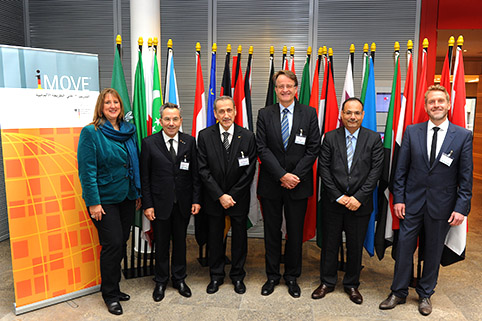
Again, the main attraction of the Education Forum was vocational training and continuing education, which in many countries is perceived as a central instrument in solving the most pressing employment problems. The discussion focused in particular on the change regarding the social status of vocational education and training, the necessity of attractive income levels, the combination of vocational training and employment and impediments in vocational education and training for women.
The foreign guests hailed from 11 different countries, with the majority coming from Iraq.
The experts agreed that vocational education and training is a key factor in the sustainable development of society and the economy, which both are based on the development of the personality of each and every individual. National governments are regarded as being responsible for establishing further basic structures and for introducing measures to enable especially the young population to develop their personal resources and potential in an appropriate manner.
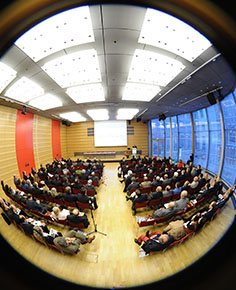
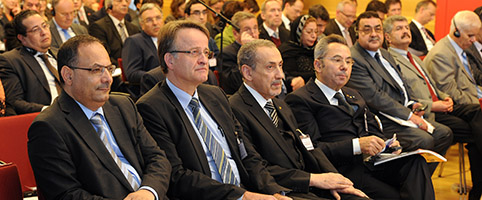
Opening
Development potential and opportunities all around
After welcoming all attending guests, Markus Milwa, Head of Section iMOVE, spoke about the current case of a Palestinian refugee from Syria. Thanks to this man's good vocational education and training and resulting qualifications, he was able to attract the interest of a German company whilst still residing in Istanbul; in future, he will fill the gap created at that enterprise by the skilled labour shortage. This example was intended to encourage all attendants to commit themselves even more intensively to promoting vocational qualification and to aim at presenting as many noteworthy projects as possible at the next WorldSkills competition 2017 in Abu Dhabi – hosted for the first time in an Arab country.
Abdulaziz Al-Mikhlafi, Secretary General of Ghorfa, emphasised the economic benefit of a well-trained workforce. At the same time, he identified the creation of employment opportunities as a major challenge for the region, which requires co-operation with countries such as Germany.
On behalf of the German Federal Ministry of Education and Research, Director General Volker Rieke conveyed greetings from the minister and highlighted the quality characteristics of the German dual system of vocational education and training that is considered exemplary in many parts of the world. He underlined the willingness of Germany to further expand its international co-operation in the area of vocational education and training so that also international partners can partake in the experiences Germany brings to the table.
Professor Dr Ossama bin Abdul Majed Shobokshi, Ambassador of the Kingdom of Saudi Arabia, compared the educational systems and expenditure for education in the Gulf States. In addition to many ambitious plans, he mentioned also several already implemented projects and emphasised the desirability of the market for German providers of education due to the numerous school graduates in the region.
Professor Dr Wassilios E. Fthenakis, President of the Didacta Association, advocated concentrating on the strengthening of children's competences in modern education systems. He issued a call for integrating new partners with different perspectives into the education debate and to shape it in co-operation with these.
BIBB Head of Department Birgit Thomann outlined the main aspects of the German Federal Institute for Vocational Education and Training's (BIBB) many years of international activity and commitment. Surveys and international enquiries, she said, indicated an increasing trend towards international co-operation in the education sector. Since development potential and opportunities exist on all sides, joint efforts have the greatest prospects of success, so Thomann.
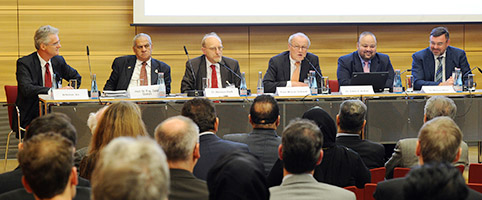
Session 1: Arab-German Cooperation in Vocational Training and Higher Education: Frameworks and Perspectives
Challenges and chances of worldwide megatrends
Education expert Peter Michael Schmidt launched the first session by referring to the high risk of youth unemployment worldwide and the Arab countries' employment market reforms as a reaction to this trend. He preceded the individual presentations by asking the following central questions:
Which demands on qualification are there? What do appropriate education systems look like? How does transfer of know-how work? How can quality standards best be achieved? In what way do measures in Germany or in the Arab countries need to be organised?
In his presentation, Dr Heinrich Kreft from the German Federal Foreign Office identified education as a pillar of German cultural diplomacy. Against the background of the megatrend globalisation, he presented the German scientific and innovation institutions as platforms for research institutions and enterprises.
Dr Saleh Al-Amr from the TVTC Saudi Arabia spoke about the large amount of investments his country pours into education. He named the "Colleges of Excellence" as a new PPP education project, which is met by a high degree of demand. [TVTC: Technical and Vocational Training Corporation, PPP: Public Private Partnership]
Dr Michael Klees, Dean of the Technical Trainers College, presented the qualification of trainers as his institution's unique selling proposition in Saudi Arabia. In future, the intention is to train up to 1,200 trainers per year in Saudi Arabia in 3-year, internationally acknowledged bachelor courses. As of February 2014, a new department for "Automotive Engineering" will be established and a future department for the training of women is planned.
Professor Dr Galal Osman, Director of the Egyptian wind energy association, vehemently called for investments in both renewable energy sources and skilled professionals for this sector. His view is that this will effectively counteract both the widespread unemployment in the Arab countries and the worldwide climate catastrophe.
Antonius Jax from the Deutsche Gesellschaft für Internationale Zusammenarbeit (GIZ – German Society for International Cooperation) shed light on the international megatrend "Standardisation of vocational education and training". He spoke about a 2-year project for the development of national employment standards in Bahrain, the aim of which is to establish 125 new occupational standards under the auspices of the labour ministry.
The subsequent discussion concentrated on improving the image of vocational education and training by skilful marketing campaigns and on the utilisation of e-learning instruments for augmenting vocational training courses.
Organiser
iMOVE
Federal Institute for Vocational Education and Training (BIBB)
Robert-Schuman-Platz 3 • 53175 Bonn • Germany
Phone: +49 228 107-1745 • Fax: 0228 107-2895
Ghorfa
Arab-German Chamber of Commerce and Industry e. V.
Garnisonkirchplatz 1 • 10178 Berlin • Germany
Phone: +49 30 278907-0 • Fax: +40 30 278907-49
Didacta Association of the German Education Industry
Rheinstrasse 94 • 64295 Darmstadt • Germany
Phone: +49 6151 3191-41 • Fax: +49 6151 3191-44
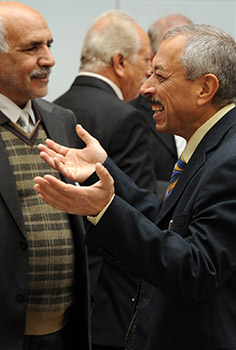
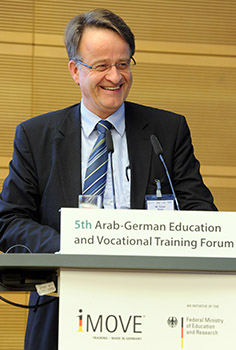
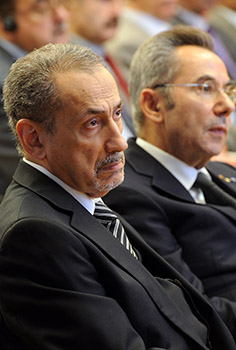
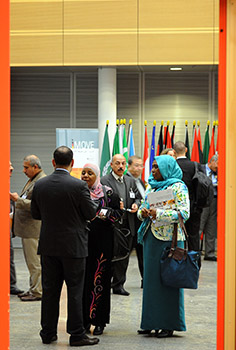
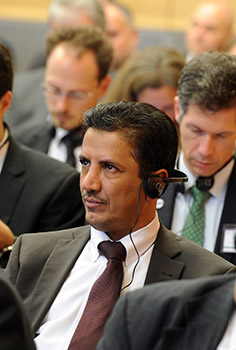
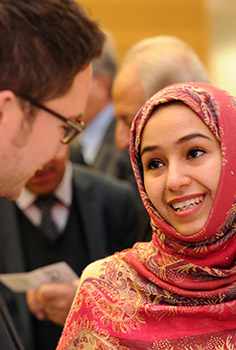
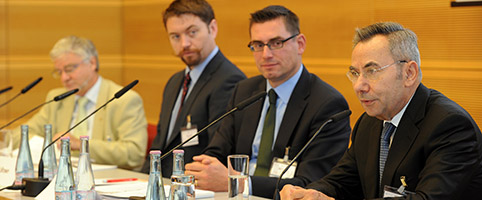
Session 2: Education and Teaching - Basis for Industry and Research
Strategy recommendations for practical implementation
Jochen Renger (Deutsche Gesellschaft für Internationale Zusammenarbeit - GIZ) and his guests looked at vocational training and continuing occupational education as a holistic approach to pave the way for industrial and academic research. The presenter enquired after education perspectives, the potential gap between science and practice and strategy recommendations resulting from experiences made so far.
Professor Dr Wassilios E. Fthenakis, President of the Didacta Association, called for a reform of the existing education systems with the goal of nurturing children from as early as immediately after birth by way of targeted interaction and thereby newly defining learning processes. "Co-construction" with its emphasis on the strengths of the child is intended to individualise and differentiate learning processes in a new didactic approach.
Daniel Brown from the Saudi Electric Services Polytechnic (SESP) spoke about a new education institution in Saudi Arabia, where since 2012 430 apprentices per year complete a two-and-a-half-year engineering programme in the electricity sector. The practice-oriented courses, which are carried out partly at specifically designed workshops, partly at enterprises within the industry, conclude with the attainment of a diploma, which is intended to become the standard in the entire Gulf region.
Professor Dr Rainer Würslin, Dean at the Esslingen University of Applied Sciences, talked about the proximity to the industry that is a feature of the engineering courses at his educational institution and about the necessity of integrating teaching and learning content regarding cyber-physical production systems (industry 4.0) and smart factories into the curriculum. In this context, he demanded new norms and standards as well as security standards for cloud computing and storage.
Subsequent audience questions in the first line targeted details of early childhood learning, the accreditation of vocational education and training programmes in Saudi Arabia and the potential future decentralisation of the energy supply in that country.
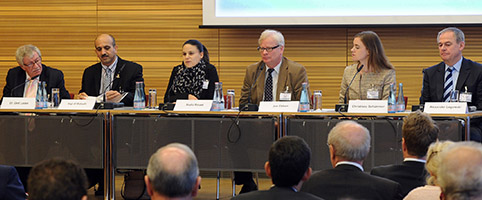
Session 3: TVET made in Germany: Meeting Demands for Future Oriented Education and Training
Measures for increasing attractiveness
Presenter Nadia Rinawi from the RAK Free Trade Zone Authority in the United Arab Emirates ushered in the third session by introducing the following speakers. [RAK: Ras Al Khaimah]
Christiana Schümmer from the German Federal Ministry of Education and Research (BMBF) presented to the audience the German federal government's current strategy for international co-operation in the field of vocational education and training. She highlighted the MENA region as an important market and pointed out that, already, vocational training and occupational continuing education constitute a central topic in the bilateral dialogue. [MENA: Middle East and North Africa]
By way of numerous examples (posters, films, slogans), Alexander Legowski from the Zentralverband des Deutschen Handwerks (ZDH – German Confederation of Skilled Crafts) presented the most important aspects of the current image campaign of the skilled crafts in Germany. Success monitoring proves that the attractiveness of occupations in the crafts could be increased in the target group of young people, who were addressed on the (online) channels they tend to prefer. To this end, 50 million Euro were expended during the first five years; a continuation of the campaign is planned.
According to Haji Al Balushi from the Ministry of Manpower in Oman, his country with its Strategy 2020 aims for the quantitative and qualitative expansion of the skilled labour basis by way of various diploma programmes, vocational education and training and short-term programmes. In choosing and developing the programmes, the successful programmes in Asian emerging countries provided a model.
Dr Gert Loose from the University of Bremen summarised the positive and optimistic development of vocational education and training in Oman over the course of the past 15 years. While immense successes were achieved with regards to standards and curricula as well as the involvement of the private sector in the vocational training provision, this development is continued with great efforts as regards training the training staff – also with German support. He recommended also for other countries the establishment of an organisation for the planning and success monitoring of vocational education and training reforms; such an organisation has been successfully implemented in Oman.
During the subsequent discussion it became clear that Oman in particular places emphasis on improved options for recognition and – in this context – on better pay for increasing the attractiveness of vocational education and training.
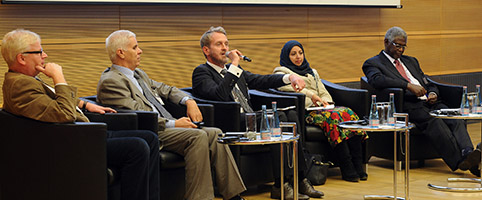
Plenary Session: Initiatives and Projects in the Arab World
Framework conditions in selected states
In the concluding plenary session, Markus Milwa (iMOVE) welcomed in addition to a representative from the German Federal Institute for Vocational Education and Training (BIBB) also three representatives from Yemen, Algeria and Sudan, respectively, who spoke about the conditions and framework conditions of vocational education and training with great authenticity.
Jan Ebben from the BIBB spoke about the constitution and the interrelations of the Federal Institute under consideration of its international contacts. He moreover told about a project targeting the modularisation of eleven vocational education and training professions, which, in respectively adapted form, could provide an interesting model also for international interested parties.
In her presentation, Lamya Yahya Al-Eryani from the Yemeni Education Ministry focused on the qualification options open to girls and women, who are also of strategic importance in combating poverty in her country. On a large scale, her ministry supports projects to train women also in non-traditional sectors such as information technology and graphic design.
Nouar Bourouba from the Vocational Education and Training Ministry in Algeria made a case for the improved integration of vocational education and occupational continuing education into the education system of his country. Moreover, he said that vocational education and training requires improved standards in order to satisfy the demands of the economy. He added that the long-standing Algerian-German co-operation in the field of vocational education and training is exceptionally successful and must be continued.
Professor Mubarak Mohamed Ali Magzoub, Secretary General of the Federation of Arab Scientific Research Councils in Sudan, once more highlighted the low degree of social prestige associated with vocational education and training in the Arab countries, which prevents the dissemination of corresponding measures and programmes. For example, by opening up well-respected posts in public administration for graduates of technical occupations, the state could actively contribute to increasing the attractiveness of vocational education and training.
The concluding discussion illustrated clearly that, since some years ago, people seeking employment in the Arab world are undergoing a change of awareness: because numerous university graduates cannot find work, more and more complete an additional technical vocational education course in order to obtain training in line with market requirements and to find employment. However, even good training does not guarantee a chance for finding employment if corresponding jobs are simply not available.
Therefore, it remains a challenge both in the Arab countries and in Germany to win over a sufficient number of young people – sufficient in the eyes of the economy – to choose vocational education and training as their career path.
Several experts emphasise that in the Arab countries the social recognition of an occupation plays a prominent role when choosing a profession. In turn, the choice of profession is linked to the financial income that can be achieved by working in that profession. According to the experts, it is therefore absolutely necessary to provide more attractive remuneration for qualified work in those professions not requiring academic training. This is also more likely to lead to a choice of profession that follows the individual's own preferences and strengths.
With regards to vocational education and training measures for girls and women, it is moreover important to take into consideration that major basic reservations against entering into an occupation remain in particular within the families.
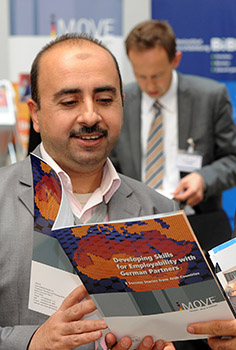
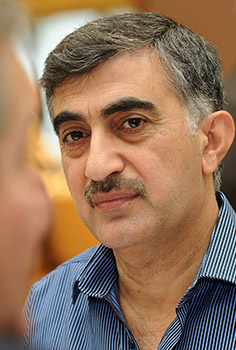
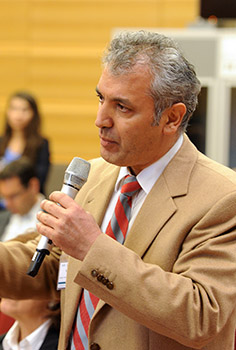
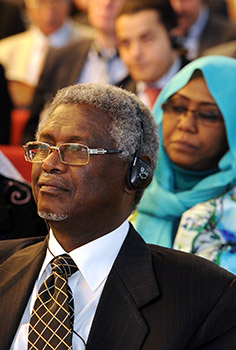
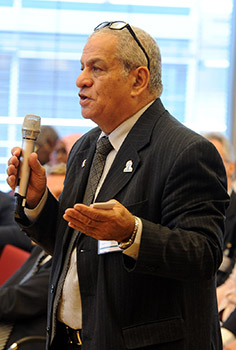
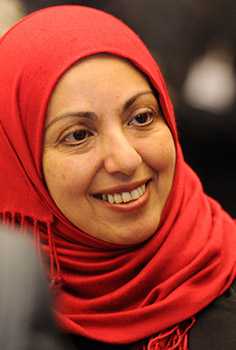
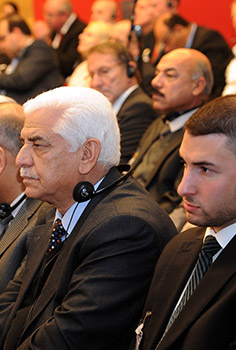
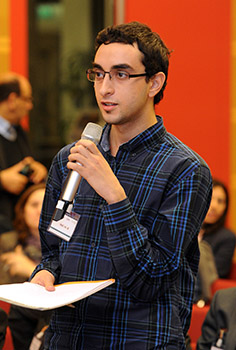
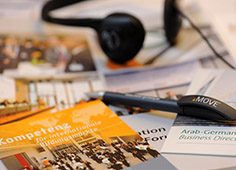
This part is only available in English.
Opening
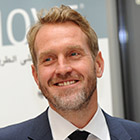
Markus Milwa
Head of Section "iMOVE: Training - Made in Germany" at the Federal Institute for Vocational Education and Training (BIBB)
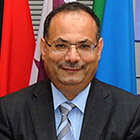
Abdulaziz Al-Mikhlafi
Secretary General of the Ghorfa Arab-German Chamber of Commerce and Industry
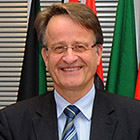
Volker Rieke
Director General of European and International Cooperation in Education and Research, Federal Ministry of Education and Research
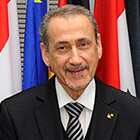
His Excellency Professor Dr. Ossama bin Abdul Majed Shobokshi
Ambassador of the Kingdom of Saudi Arabia and Doyen of the Arab Diplomatic Corps
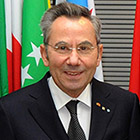
Professor Dr. Wassilios Emmanuel Fthenakis
President of the Didacta Association of the German Education Industry
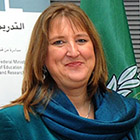
Birgit Thomann
Head of Department "Internationalisation of VET (Vocational Education and Trianing) / Knowledge Management" at the Federal Institute for Vocational Education and Training (BIBB)
Session 1: Arab-German Cooperation in Vocational Training and Higher Education: Frameworks and Perspectives
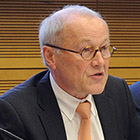
Peter Michael Schmidt
Senior Expert, Germany
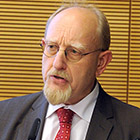
Dr. Heinrich Kreft
Ambassador International Academic and Educational Relations and Dialogue among Civilizations at the Federal Foreign Office, Germany
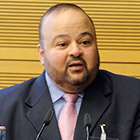
Dr. Saleh Al-Amr
Vice Governor for Strategic Partnerships, Technical and Vocational Training Corporation (TVTC), Saudi Arabia
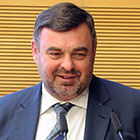
Dr. Michael Klees
Dean, Technical Trainers College (TTC) Riyadh, Saudi Arabia
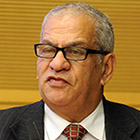
Professor Dr. Galal Osman
Director, HEEP - Higher Education Enhancement Project, Egyptian Ministry Higher Education and Scientific Research, Egypt
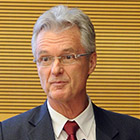
Antonius Jax
Teamleader for the National Occupational Standards project, Deutsche Gesellschaft für Internationale Zusammenarbeit (GIZ) GmbH, Bahrain
Session 2: Education and Teaching – Basis for Industry and Research
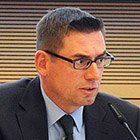
Jochen Renger
Regional Director Arab Region, Deutsche Gesellschaft für Internationale Zusammenarbeit (GIZ) GmbH, Germany

Professor Dr. Wassilios Emmanuel Fthenakis
President of the Didacta Association of the German Education Industry, Germany
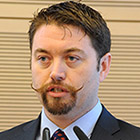
Daniel Brown
Project Manager, Saudi Electric Services Polytechnic (SESP), Saudi Arabia
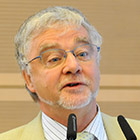
Professor Dr. Rainer Würslin
Dean, University of Applied Sciences Esslingen, Germany
Session 3: TVET made in Germany: Meeting Demands for Future Oriented Education and Training
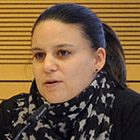
Nadia Rinawi
Head of International Offices, RAK (Ras Al Khaimah) Free Trade Zone Authority, United Arab Emirates
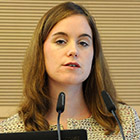
Christiana Schümmer
Officer at the Division "EU Education Programmes, International Cooperation in Education", Federal Ministry of Education and Research, Germany
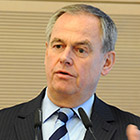
Alexander Legowski
Director for Press and Public Relations, ZDH - German Confederation of Skilled Crafts, Germany
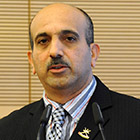
Haji Al Balushi
Director of the General Direction of Vocational Training, Ministry of Manpower, Oman
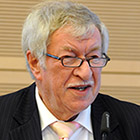
Dr. Gert Loose
University of Bremen, Germany
Plenary Session: Initiatives and Projects in the Arab World

Markus Milwa
Head of Section "iMOVE: Training - Made in Germany" at the Federal Institute for Vocational Education and Training (BIBB), Germany
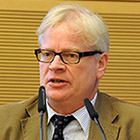
Jan Ebben
Research Associate, Federal Institute for Vocational Education and Training (BIBB), Section "International Cooperation and Advisory Services / Central Office for International Cooperation in Vocational Education and Trianing (VET)", Germany
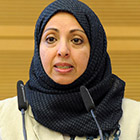
Lamya Yahya Al-Eryani
Deputy Minister of Girl Education and Training, Ministry of Technical Education and Vocational Training, Yemen
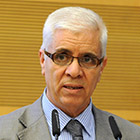
Nouar Bourouba
Inspector General, Ministry of Vocational Training and Education, Algeria
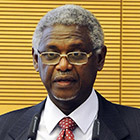
Professor Mubarak Mohamed Ali Magzoub
Secretary General, Federation of Arab Scientific Research Councils, Sudan